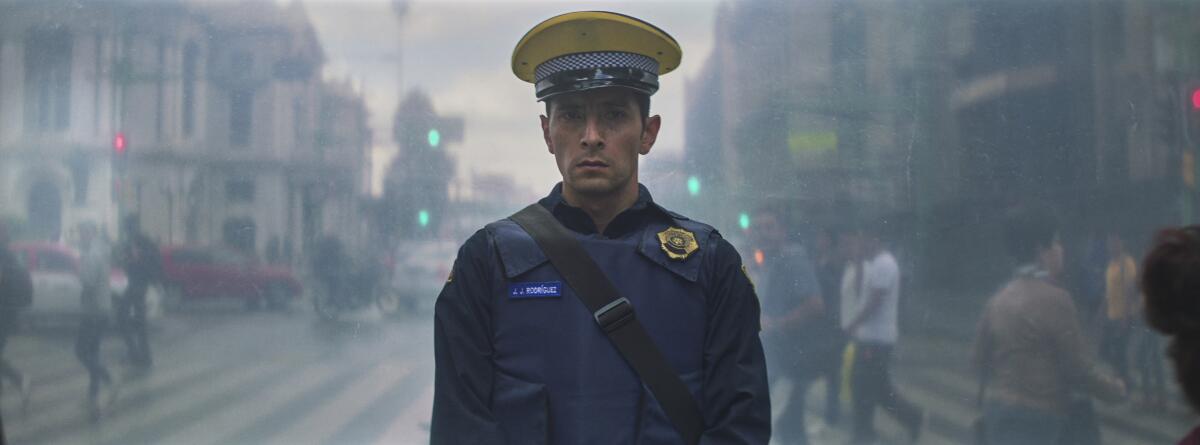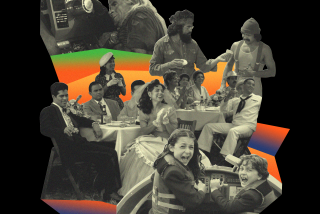Review: Corruption, stress and romance fuel hybrid documentary ‘A Cop Movie’

- Share via
The Times is committed to reviewing theatrical film releases during the COVID-19 pandemic. Because moviegoing carries risks during this time, we remind readers to follow health and safety guidelines as outlined by the Centers for Disease Control and Prevention and local health officials.
Few movies and TV series centered on law enforcement ever feel tethered to the reality of policing as a living. Most of the stories that get made traffic in a well-worn hero narrative about cops. As society is increasingly realizing, this practice has perhaps done more harm than good when compared with the truth of what policing is, both for those wearing the badge and those they’re supposed to protect.
There aren’t too many documentaries, either, digging into the mindset of day-to-day life on patrol, which makes Mexican filmmaker Alonso Ruizpalacios’ “A Cop Movie” an unusual effort in understanding. It’s built from interviews with two veteran members of the Mexico City police force, Teresa and Montoya, a pair of flawed but clear-eyed shift workers who wrestle with the contradictory impulses and clockwork corruptions of an alternately boring and dangerous gig. That they also fell in love on the job created its own comforts and complications.
But Ruizpalacios’ film is also unusual stylistically, in that it’s an intimate, disorienting hybrid of nonfiction and fiction that illustrates Teresa’s and Montoya’s narrated accounts with actors: Mónica Del Carmen as Teresa, and Raúl Briones as Montoya. Additionally, the movie offers those actors’ own experiences training for their parts at real police academies as a nested documentary, one that directly comments on a larger notion that wearing a uniform is a form of role-playing.
If that sounds more like a treatise than a movie, it can be, especially when its ideas are explicitly voiced by the actors in the straight-doc portion — Del Carmen and Briones musing aloud on their phones at the end of a long day learning police techniques, about the worrisome gap they notice between required levels of skill and courage, and the trainees’ emotional greenness. For many of the younger applicants, they observe, it’s a needed paycheck first and foremost, and their hope is that the uniform, the gun, the car, and the badge will make manifest the expected toughness for a life-or-death job. What could possibly go wrong?
The stories Teresa and Montoya tell, however, about their identities and experiences, lip-synched by Del Carmen and Briones in Ruizpalacios’ imagined enactments, form a richer psychological picture of a hard job’s toll — how her seeking approval from her cop dad fueled her drive to succeed, how his emotional vulnerability as a divorced father made him a danger, and how becoming partners turned into a healing romance. We also learn how the grind of bribes and indignities, meanwhile, chews up the well-intentioned — paying to get the right vest or squad car, then shaking down civilians to help pay bills (and more bribes). The open dysfunction only fosters a lasting distaste between a citizenry that feels unprotected, and cops who feel unappreciated.
The effect of these fourth-wall-breaking scenes, fleshed out by Ruizpalacios and co-writer David Gaitán to feel like adorned monologues, is of an isolating toil with little reward, regular punishment and scant motivation to do better. With cinematographer Emiliano Villanueva’s widescreen framing stretching the tense loneliness of night patrolling and daytime drudgery, Ruizpalacios shows the same seductive eye for image-making, location authenticity and wry humor that in his first two movies (“Güeros” and “Museo”) earned him cachet as one of Mexico’s more exciting new filmmakers. He’s also a sly eccentric, turning a foot chase into a cop-show parody, complete with brassy ‘70s action music. The myth-busting point is ham-fisted, but it’s amusing nevertheless.
The blurring of real testimony with a compassionate filmmaker’s inventions is so compelling that when the documentary portion arrives, the movie can’t help but sink a bit — what better compliment to Del Carmen and Briones that they’re more interesting bringing to life the real police officers they’ve studied than commenting on it from the inside? The police-are-people-too narrative may not be everyone’s bag right now, but in its artful engagement with demystifying perspectives, “A Cop Movie” at least adds to an important conversation instead of further widening an impasse.
'A Cop Movie'
In Spanish with English subtitles
Rated: R for language and brief sexuality
Running time: 1 hour, 47 minutes
Playing: Starts Oct. 20, Laemmle Monica, Santa Monica; available Nov. 5 on Netflix
More to Read
Only good movies
Get the Indie Focus newsletter, Mark Olsen's weekly guide to the world of cinema.
You may occasionally receive promotional content from the Los Angeles Times.







